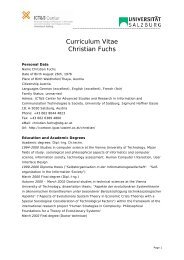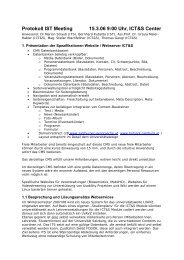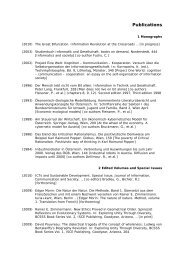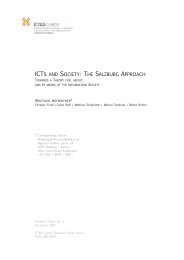CHRISTIAN FUCHS - ICT&S - Universität Salzburg
CHRISTIAN FUCHS - ICT&S - Universität Salzburg
CHRISTIAN FUCHS - ICT&S - Universität Salzburg
Create successful ePaper yourself
Turn your PDF publications into a flip-book with our unique Google optimized e-Paper software.
Christian Fuchs: Social Networking Sites and the Surveillance Society”Surveillance as the mobilising of administrative power – through the storage andcontrol of information – is the primary means of the concentration of authorativeresources involved in the formation of the nation-state” (Giddens 1985: 181).Other than Foucault, Giddens does not see surveillance as something entirely negativeand dangerous and argues that surveillance phenomena also enable modernorganization and simplify human existence. Giddens and others do not use surveillanceas a critical, but a relatively neutral notion. The violent and coercive aspects ofsurveillance cannot be criticized adequately within such frameworks. To limit thenotion of information society to surveillance is a narrow perspective that ignores thespecific role of knowledge and information technologies in contemporary capitalism.For Kevin Haggerty (2006), the employment of the category of Bentham’s panopticonintroduced by Foucault into surveillance studies is not suitable for analyzingsurveillance in the information society because surveillance would no longer serve thesingle coherent purpose of control as with e.g. weblogs and webcams more and morepeople are viewers at home, work, or leisure (cf. also Bogard 2006 who argues withDeleuze and Guattari that surveillance today is not only repressive capture, but also aline of flight from oppression; Koskela 2006). For characterizing the plural character ofsurveillance, Haggerty and Ericson (2000) have coined the concept of the surveillanceassemblage. Haggerty (2006) argues that private actors now also conduct surveillance.His notion of surveillance is close to the one of Giddens.The notion of surveillance as potentially empowering has also been taken up in ISNSresearch: Anders Albrechtslund (2008) argues that social networking sites show thatsurveillance is not necessarily disempowering, but is “something potentiallyempowering, subjectivity building and even playful”.“Online social networking can also be empowering for the user, as the monitoringand registration facilitates new ways of constructing identity, meeting friends andcolleagues as well as socializing with strangers. This changes the role of the userfrom passive to active, since surveillance in this context offers opportunities totake action, seek information and communicate. Online social networkingtherefore illustrates that surveillance – as a mutual, empowering and subjectivitybuilding practice – is fundamentally social” (Albrechtslund 2008).Albrechtslund speaks in this context of participatory surveillance:“The practice of online social networking can be seen as empowering, as it is away to voluntarily engage with other people and construct identities, and it canthus be described as participatory. It is important to not automatically assume thatthe personal information and communication, which online social networking isbased on, is only a commodity for trading. Implicit in this interpretation is that tobe under surveillance is undesirable. However, to participate in online socialnetworking is also about the act of sharing yourself – or your constructed identity– with others. (…) In this case, participatory surveillance is a way of maintainingfriendships by checking up on information other people share” (Albrechtslund2008).23









